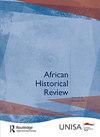State “Infrastructural Power” and the Bantustans: The Case of School Education in the Transkei and Ciskei
IF 0.1
Q3 HISTORY
引用次数: 1
Abstract
Abstract In this article I explore the authority of the state (and its “infrastructural power”) in school education in the Eastern Cape bantustans during and after “homeland” rule. I focus my narrative on the period of the 1970s, when the Transkei obtained independence and the education systems expanded substantially in both the Ciskei and Transkei. I will show that the education administrations in the Ciskei and Transkei retained weak control over the expansion of the education system, and weakly and unevenly supervised the work of teachers and the allocation of education resources in schools. Professional teacher associations played a role in containing protest against the bantustan state and the policy of separate development, but they could not cajole the compliance of a demoralised and stressed teaching population as education massified in both bantustans. Further, the education administrations struggled to regulate social relations in a way that supported the routine provision of education. While the force of a despotic “state” could sometimes be sharply felt when teachers voiced political dissent in the Transkei and Ciskei, many schools were governed with a good deal of autonomy from the bantustans’ administrations. In the post-apartheid period, the state administration remains weak in authority in the education sector. I explore some of the reasons for this continuity and its implications for education provision in the Eastern Cape today. While I make my argument for weak state infrastructural power in the case of the Transkei and Ciskei, I show that my argument may have broader relevance to other bantustans and other sectors (i.e. apart from education) in the country.国家“基础设施力量”和班图斯坦:特兰斯凯和西斯凯的学校教育案例
摘要在这篇文章中,我探讨了在“祖国”统治期间和之后,国家(及其“基础设施权力”)在东开普班图斯坦学校教育中的权威。我把叙述的重点放在20世纪70年代,当时特兰斯基获得独立,教育系统在西斯基和特兰斯基都大幅扩张。我将表明,Ciskei和Transkei的教育行政部门对教育系统的扩张控制不力,对教师的工作和学校教育资源的分配监督不力且不均衡。专业教师协会在遏制对班图斯坦州和单独发展政策的抗议方面发挥了作用,但随着教育在两个班图斯坦的普及,他们无法哄骗士气低落、压力重重的教师群体遵守规定。此外,教育行政部门努力以支持日常教育的方式规范社会关系。当教师在特兰斯基和西斯基表达政治异议时,有时会强烈感受到专制“国家”的力量,但许多学校的管理与班图斯坦政府有很大的自主权。在后种族隔离时期,国家行政部门在教育部门的权威仍然薄弱。我探讨了这种连续性的一些原因及其对今天东开普省教育提供的影响。虽然我在Transkei和Ciskei的案例中提出了国家基础设施力量薄弱的论点,但我表明,我的论点可能与该国其他班图斯坦和其他部门(即教育之外)有更广泛的相关性。
本文章由计算机程序翻译,如有差异,请以英文原文为准。
求助全文
约1分钟内获得全文
求助全文

 求助内容:
求助内容: 应助结果提醒方式:
应助结果提醒方式:


